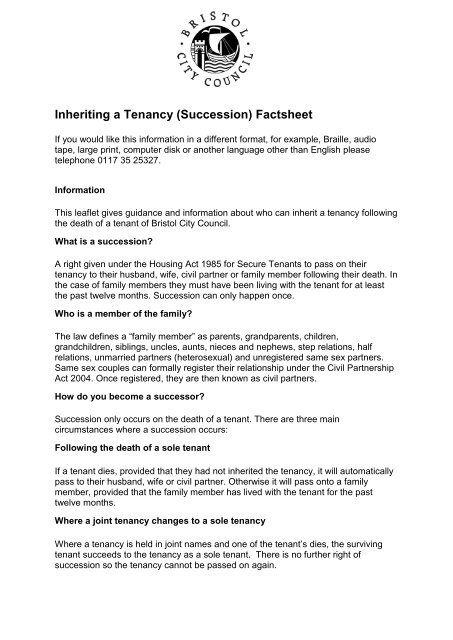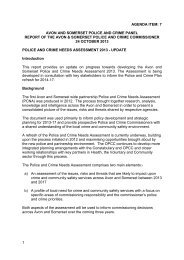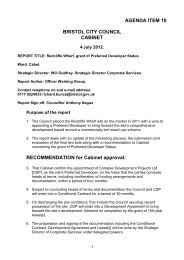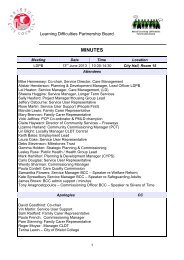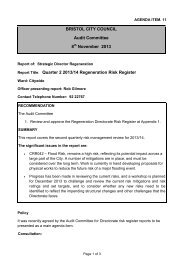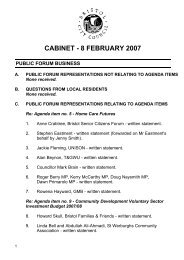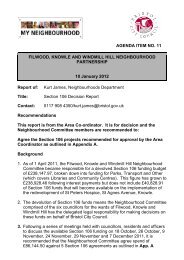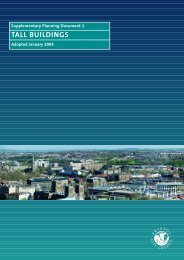Inheriting a Tenancy (Succession) Leaflet - Bristol City Council
Inheriting a Tenancy (Succession) Leaflet - Bristol City Council
Inheriting a Tenancy (Succession) Leaflet - Bristol City Council
Create successful ePaper yourself
Turn your PDF publications into a flip-book with our unique Google optimized e-Paper software.
<strong>Inheriting</strong> a <strong>Tenancy</strong> (<strong>Succession</strong>) Factsheet<br />
If you would like this information in a different format, for example, Braille, audio<br />
tape, large print, computer disk or another language other than English please<br />
telephone 0117 35 25327.<br />
Information<br />
This leaflet gives guidance and information about who can inherit a tenancy following<br />
the death of a tenant of <strong>Bristol</strong> <strong>City</strong> <strong>Council</strong>.<br />
What is a succession?<br />
A right given under the Housing Act 1985 for Secure Tenants to pass on their<br />
tenancy to their husband, wife, civil partner or family member following their death. In<br />
the case of family members they must have been living with the tenant for at least<br />
the past twelve months. <strong>Succession</strong> can only happen once.<br />
Who is a member of the family?<br />
The law defines a “family member” as parents, grandparents, children,<br />
grandchildren, siblings, uncles, aunts, nieces and nephews, step relations, half<br />
relations, unmarried partners (heterosexual) and unregistered same sex partners.<br />
Same sex couples can formally register their relationship under the Civil Partnership<br />
Act 2004. Once registered, they are then known as civil partners.<br />
How do you become a successor?<br />
<strong>Succession</strong> only occurs on the death of a tenant. There are three main<br />
circumstances where a succession occurs:<br />
Following the death of a sole tenant<br />
If a tenant dies, provided that they had not inherited the tenancy, it will automatically<br />
pass to their husband, wife or civil partner. Otherwise it will pass onto a family<br />
member, provided that the family member has lived with the tenant for the past<br />
twelve months.<br />
Where a joint tenancy changes to a sole tenancy<br />
Where a tenancy is held in joint names and one of the tenant’s dies, the surviving<br />
tenant succeeds to the tenancy as a sole tenant. There is no further right of<br />
succession so the tenancy cannot be passed on again.
Assigned tenancy: Where a tenancy has been legally assigned<br />
Any tenant, who has not succeeded to the tenancy, has the right to assign (pass) the<br />
tenancy to their husband, wife, civil partner, or a family member who is living with<br />
them and has lived with them for the past twelve months. However, this must be<br />
done by a legal document called a Deed of Assignment. A person taking the tenancy<br />
in this way is counted as a successor.<br />
The courts can also order an assignment between married partners and civil<br />
partners as a result of divorce proceedings, or dissolution of a civil partnership. This<br />
is called a “tenancy transfer”.<br />
Your Customer Service Point can advise you on assignments. However, you may<br />
also want to take legal advice from the Citizens Advice Bureaux or a solicitor as<br />
there are a number of matters to consider. For example, if you assign your tenancy<br />
you would also lose your right to occupy the property. If you then become homeless<br />
the council might not have a duty to re-house you. Assigning a tenancy could also<br />
have an effect on the household’s entitlement to housing benefit.<br />
Some examples of succession<br />
Mr & Mrs Smith: Joint tenants. Mr Smith dies.<br />
Mrs Smith remains as the sole tenant but she is a “successor” because the joint<br />
tenancy has become a sole one. However, she will now have no right to pass on the<br />
tenancy again in law.<br />
Ms Jones is a sole tenant. Ms Walker is the civil partner of the tenant. Ms<br />
Jones dies.<br />
Ms Walker becomes the sole tenant. She has succeeded to Ms Jones tenancy.<br />
Therefore once again she cannot, in law, pass on the tenancy.<br />
Mr Smith: Sole tenant. Mrs Smith: Dies.<br />
Mr Smith remains a tenant just as before. He is free to pass on the tenancy to a<br />
family member provided they have lived with him for 12 months.<br />
Can more than one person take a succession?<br />
No: The law provides there can only be one successor. In the case of a married<br />
couple or civil partner, when one of the partners dies the other partner automatically<br />
takes the tenancy by succession. Where there is no husband, wife, civil partner it is<br />
up to the family members living there to decide which one will take the succession<br />
and hold the tenancy from there on.
If a member of my family succeeds to the tenancy, can they stay in the family<br />
home?<br />
If the member of the family succeeding is the husband, wife or civil partner they have<br />
the right to remain in the family home. However if the successor is anybody else the<br />
council reserves the right to ask him or her to move, if the property is larger than they<br />
need. This includes an unmarried or unregistered (same sex) partner. For example;<br />
a single person left in a three bedroom flat or in a two bedroom house, in view of the<br />
limited supply of accommodation for families.<br />
What if there has already been one succession?<br />
Under the terms of the 1985 Housing Act, the council has a legal duty to allow one<br />
succession only.<br />
By law, a second succession is not possible. However, in some special cases, if a<br />
successor tenant dies the council could decide to grant a new tenancy where a<br />
person:<br />
• Has been continuously living with the tenant for at least 12 months.<br />
• Has been looking after the tenant.<br />
• Has accepted responsibility for the tenant’s dependents. That is provided the<br />
dependents themselves do not have a right of succession. To qualify you will<br />
be required to provide evidence, (for example utility bills, bank statements or<br />
correspondence).<br />
If you do not qualify for succession but you are recognised as being in priority need,<br />
then there is a duty to provide one suitable offer of alternative accommodation. In the<br />
event that an offer of suitable accommodation is refused, then the council will take<br />
steps to gain possession of the original property.<br />
In all cases, if you are living with a family member who has died you must inform<br />
your Customer Service Point as soon as possible.<br />
General advice<br />
If you wish to receive any further advice or more detail on the matters covered in this<br />
leaflet you can ask for an appointment at your Customer Service Point to have<br />
matters more fully explained. You can also seek independent legal advice at a<br />
Citizens Advice Bureaux. If you see a solicitor you should check with them whether<br />
or not a charge will be made for advice.<br />
Please note:<br />
Under the Civil Partnership Act 2004, succession rights now extend to same sex<br />
relationships provided they are registered as Civil Partnerships.
Further information<br />
Citizens Advice Bureaux<br />
For free independent legal advice and information please phone 0844 499 4718.<br />
Complaints, Comments or Compliments<br />
<strong>Bristol</strong> <strong>City</strong> <strong>Council</strong> is committed to providing a high quality service to all its<br />
customers and welcomes your feedback. You can do this by submitting a complaint,<br />
comment, or compliment about the services you have received.<br />
If you wish to do this you can complete our online for at<br />
www.bristol.gov.uk/faircomment. You can also obtain a fair comment leaflet from any<br />
Customer Service Point or by contacting our Customer Services Centre.<br />
How to contact us<br />
If you need to contact the Estate Management Service details are set out below<br />
General enquires: 0117 922 2200 (option 4)<br />
Textphone: 0117 357 4444<br />
Fax: 0117 352 5104<br />
By Post:<br />
Estates, PO Box 595, <strong>Bristol</strong>, BS99 2AW<br />
By Email:<br />
estates@bristol.gov.uk<br />
By Internet:<br />
www.bristol.gov.uk/estates<br />
Customer Service Points<br />
If you would like to see someone in person you can visit any Customer Service<br />
Point. Please note opening hours are Monday, Tuesday and Thursday from 9am to<br />
5pm, Wednesday 10.30am to 5pm and Friday 9am to 4.30pm. Extended opening<br />
times are available at Phoenix Court, please telephone 0117 922 2200 to check.<br />
Lawrence Weston<br />
Ridingleaze House<br />
Lawrence Weston<br />
<strong>Bristol</strong><br />
BS11 0QE<br />
Fishponds<br />
Robinson House<br />
Hockeys Lane<br />
<strong>Bristol</strong><br />
BS16 3HL<br />
Hartcliffe<br />
Symes House<br />
Peterson Square
Hartcliffe<br />
<strong>Bristol</strong><br />
BS13 0BD<br />
Southmead<br />
Southmead House<br />
Greystoke Avenue<br />
Southmead<br />
<strong>Bristol</strong><br />
BS10 6BQ<br />
Central <strong>Bristol</strong><br />
Phoenix Court<br />
Bond Street South<br />
<strong>Bristol</strong><br />
BS1 3PH<br />
Out of Hours emergencies<br />
Tel: 0117 922 2050<br />
Textphone: 0117 922 3892<br />
Fax: 0117 922 2379<br />
If you are unsure which team you need or you have a customers’ service related<br />
enquiry you can email: customer.servicepoints@bristol.gov.uk.<br />
Produced by <strong>Bristol</strong> <strong>City</strong> <strong>Council</strong>. Revised June 2013.


